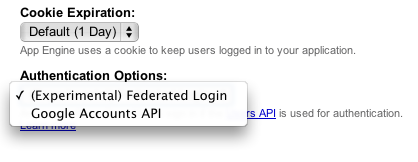Using remote_api with OpenID authentication
Posted by Nick Johnson | Filed under python, openid, app-engine, remote-api
When we recently released integrated OpenID support for App Engine, one unfortunate side-effect for apps that enable it was disruption to authenticated, programmatic access to your App Engine app. Specifically, if you've switched your app to use OpenID for authentication, remote_api - and the remote_api console - will no longer work.
The bad news is that fixing this is tough: OpenID is designed as a browser-interactive authentication mechanism, and it's not clear what the best way to do authentication for command line tools like the remote_api console is going to be. Quite likely the solution will involve our OAuth support and stored credentials - stay tuned!
The good news, though, is that there's a workaround that you can use right now, without compromising the security of your app. It's a bit of a hack, though, so brace yourself!
The essential insight behind the hack is that if we can trick the SDK into thinking that it's authenticating against the development server instead of production, it will prompt the user for an email address and password, then send that email address embedded in the 'dev_appserver_login' cookie with all future requests. We can then use the email field to instead ...
Using OpenID authentication on App Engine
Posted by Nick Johnson | Filed under python, openid, app-engine, coding, clickpass
With the release of SDK 1.3.4, preliminary support is available for native OpenID authentication in App Engine. Today, we'll demonstrate how to use the new OpenID support in your app.
Edit: There's now an official article on OpenID on App Engine!
The first step in setting up OpenID authentication is to change your app's authentication settings. Log in to the admin console, select your app, and go to "Application Settings". There, you can pull down the "Authentication Options" box, and select "(Experimental) Federated Login".

Once you've enabled OpenID authentication for your app, a few things change:
- URLs generated by create_login_url without a federated_identity parameter specified will redirect to the OpenID login page for Google Accounts.
- URLs that are protected by "login: required" in app.yaml or web.xml will result in a redirect to the path "/_ah/login_required", with a "continue" parameter of the page originally fetched. This allows you to provide your own openid login page.
- URLs generated by create_login_url with a federated_identity provider will redirect to the specified provider.
In order to make best use of this functionality, here's what we'll do:
- Provide an OpenID login page on /_ah/login_required ...
Taking advantage of the new Apps Marketplace
Posted by Nick Johnson | Filed under openid, app-engine, python, coding, tech, apps-marketplace, aeoid
The recently unveiled Apps Marketplace has been getting a lot of attention lately, and a lot of people are wanting to know how they can integrate their App Engine app with it, making use of its integrated single-signon support. Today we'll go over what's required to get this working.
Apps Marketplace uses OpenID for SSO. Fortunately, we can use the openid library, which provides a Users-API-Lookalike interface, to support this in App Engine. There are two additional requirements for getting SSO to work in an Apps Marketplace app:
- The realm defined in the application manifest must match the realm specified in the OpenID request.
- The OpenID library must support the host-meta discovery method.
Handling the first of these is easy: The aeoid library sets the realm of an OpenID request, by default, to the domain that the request was made over, so all we need to do is use that same domain name as the realm in our app's manifest file.
The second is a little trickier. The 'janrain' python-openid library which aeoid and other Python-based solutions are based on does not support host-meta as a discovery mechanism for OpenID URLs. Let's analyze what this discovery ...